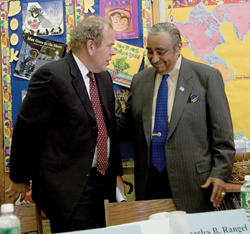The Levine Years at Teachers College
Under President Arthur Levine, TC has increased the size of its faculty from 127 in 1994 to 155 today; more than doubled research grant activity to over $31,000,000; and boosted annual giving from $6 million in 1994 to $27 million for fiscal 2005. The College has been repeatedly ranked at or near the top of education schools during that period.
Here are other highlights of the Levine years:
1995
Inaugurated as the College's ninth President, Levine urges a return to TC's original mission of improving the lot of the disadvantaged through education.
Levine meets with every faculty member in an effort that will ultimately consolidate TC's 19 academic departments and five divisions into nine departments.
After years of budget deficits, TC balances its budget, with a surplus-'"a feat it has duplicated every year since.
1996
The College begins an overhaul that ultimately will include replacement of every roof and window in the academic facility, the renovation of Milbank Chapel, the new Gottesman Libraries and a new student residence hall.
TC creates the Hechinger Institute on Education and the Media.
The Center for Educational Outreach & Innovation (CEO&I) is created to extend the College's commitment to lifelong learning.
1997
With the New York City Board of Education, TC creates the
1998
The College and the Chilean Ministry of Education agree to develop a series of pre-service and in-service training and exchange programs with College faculty for Chilean teachers.
1999
TC launches what will become the largest and most successful capital campaign ever conducted by a school of education.
Levine establishes the Teachers College Task Force on Diversity and Community.
2000
A new Center for Chinese Education is established, devoted to policy, research, educational exchanges and training and dissemination on education in
Levine establishes the new position of Assistant and Special Counsel to the President for Diversity and Community, naming TC alumna Janice Robinson to the post.
A new Office of Access and Services for Individuals with Disabilities opens, with Richard Keller as Director.
2001
The
2002
The College's credit rating is upgraded by Moody's Investors Service from A-3 to an A-1 ranking.
Levine and the Board of Trustees initiate a College-wide strategic planning process focused on TC's mission, financial aid, student life, relations with Columbia, staff development and right-sizing for the College.
2003
The College begins an on-the-ground initiative to rebuild
With the Carroll and Milton Petrie Foundation, Teachers College establishes the Petrie Fellowships for outstanding students who commit to teach in
The Cahn Fellowship Program is established to annually select top
2004
Sharon Lynn Kagan, Virginia and Leonard Marx Professor of Early Childhood and Family Policy, is named TC's first Associate Dean for Policy and head of the new Office of Policy and Research. Donald Martin is named the first Associate Dean for Enrollment and Student Services.
TC's Capital Campaign concludes, having raised $155 million. The school's endowment has nearly tripled and by mid-2005 will stand at over $170 million.
The College establishes the
TC establishes the Maxine Greene Chair for Distinguished Contributions to Education, named for its Professor Emeritus in the Arts and Humanities (at left, seated). Professor Nancy Lesko is chosen as the first Chair holder.
The Elaine Brantley Award for Community and Civility is established to honor the memory of a much beloved cashier in the TC cafeteria.
A new residence hall for TC students opens on
TC dedicates the Gottesman Libraries, home to the world's premiere collection of materials on the educating professions.
The TC Education Partnership Zone debuts-'"a collaboration with the
The Say Yes to Education Foundation, which identifies kindergarten students to receive future college scholarships and supports them to achieve that goal, announces a $50 million program in
2005
TC adopts a new mission focused on educational equity and launches The Campaign for Educational Equity to narrow the nation's gap in educational access and achievement.
TC opens new offices in the former Hotel Theresa on
TC's first annual Educational Equity Symposium documents the costs society incurs when young people drop out of high school.
2006
TC renames its Main Hall as the
The College establishes the Richard Robinson Chair in Children's Literature, through a gift from the family trust of Richard Robinson, Chairman, President and CEO of Scholastic, Inc. Professor Lucy Calkins is chosen as the first Chair holder.
Published Wednesday, Sep. 20, 2006
